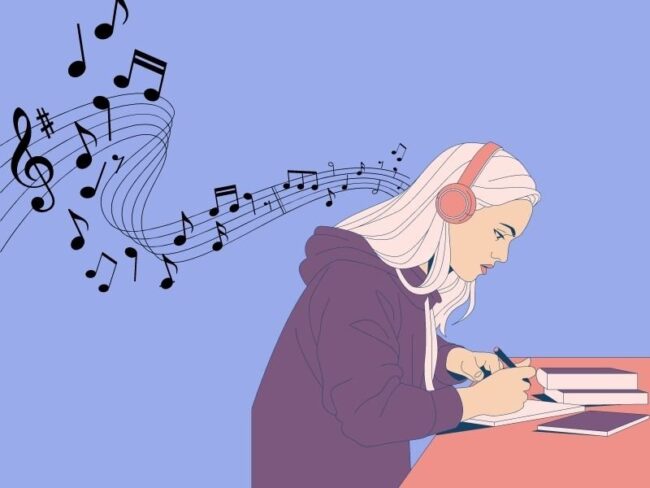By: Morgan McCullough
With final exams approaching, Fondren Library buzzes with flipping pages, packed study rooms, and Starbucks lines stretched across the entire floor. Students isolate themselves with their laptops and AirPods, struggling to retrieve the study habits they lost during the pandemic. Their legs tap to the beat as they review the same page for the third time.
People struggle to remember basic math equations, yet have an entire repertoire of songs in the back of their head that can be triggered by just a tune. Music helps the mind find patterns necessary to process and absorb information over long periods of time, which is necessary when cramming for an exam. The sense of sound stimulates the nervous system and soothes one’s anxiety, allowing them to relax and refocus, says psychotherapist Amy Burnside.
“Any activity that activates the parasympathetic nervous system will help calm our amygdala, which is the fire alarm part of our brain,” Burnside said. “This helps us get back into our pre-frontal cortex, the part of the brain used in problem solving and analytical thoughts.”
Music exercises the mind and improves cognitive performance. It activates the left side of the brain, which is logical, analytical, and methodical, as well as the right side, which is emotional, creative, and subjective. Burnside says that an individual’s productivity, focus, and mood are enhanced through song.
SMU Junior Max Shuster says he never walks into a test without headphones. He claims listening to his favorite album sets the tempo for his entire day.
“The first song I listen to in the morning changes my mood for the rest of the day,” Shuster said. “It keeps me in the right mindset. It gets me focused, ready, and excited to take the exam.”
Many SMU students, such as Shuster, add soundtracks to their study sessions as a form of escapism. The notes playing in their ears harmonize with the notes on their pages to alleviate stress, aid concentration, and add background noise. Listening to an uplifting hymn is a transcendental experience with the power to shape mental states.
Just like a massage relaxes the muscles, a soothing song can relax the mind, reduce stress, and elevate one’s mood. SMU Senior and tennis player Kathryn Smith uses music for sports and studies. Before a match, she listens to warm-up playlists to energize her body and sharpen her skills. Smith also relies on melodies to cope with pre-test jitters.
“I usually have a lot of anxiety, especially when it comes to test anxiety,” Smith said. “Music helps relieve some of the stress of studying.”
What some find calming, others find distracting. While classical pieces are inspirational for Smith, Shuster prefers the intense beats of EDM when studying. Not everyone wants to jam to Mozart when reviewing their chemistry notes, so test out different genres to find what best suits your personal needs. No matter the artist, song, or album, music can be the ideal study buddy.
Before your next trip to the library, check out the Mustang Mixtape, a collaborative playlist filled with students’ top study anthems of the midterm season.





















